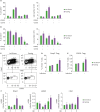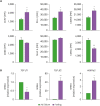Change of Dendritic Cell Subsets Involved in Protection Against Listeria monocytogenes Infection in Short-Term-Fasted Mice
- PMID: 35573152
- PMCID: PMC9066004
- DOI: 10.4110/in.2022.22.e16
Change of Dendritic Cell Subsets Involved in Protection Against Listeria monocytogenes Infection in Short-Term-Fasted Mice
Abstract
The gastrointestinal tract is the first organ directly affected by fasting. However, little is known about how fasting influences the intestinal immune system. Intestinal dendritic cells (DCs) capture antigens, migrate to secondary lymphoid organs, and provoke adaptive immune responses. We evaluated the changes of intestinal DCs in mice with short-term fasting and their effects on protective immunity against Listeria monocytogenes (LM). Fasting induced an increased number of CD103+CD11b- DCs in both small intestinal lamina propria (SILP) and mesenteric lymph nodes (mLN). The SILP CD103+CD11b- DCs showed proliferation and migration, coincident with increased levels of GM-CSF and C-C chemokine receptor type 7, respectively. At 24 h post-infection with LM, there was a significant reduction in the bacterial burden in the spleen, liver, and mLN of the short-term-fasted mice compared to those fed ad libitum. Also, short-term-fasted mice showed increased survival after LM infection compared with ad libitum-fed mice. It could be that significantly high TGF-β2 and Aldh1a2 expression in CD103+CD11b- DCs in mice infected with LM might affect to increase of Foxp3+ regulatory T cells. Changes of major subset of DCs from CD103+ to CD103- may induce the increase of IFN-γ-producing cells with forming Th1-biased environment. Therefore, the short-term fasting affects protection against LM infection by changing major subset of intestinal DCs from tolerogenic to Th1 immunogenic.
Keywords: Dendritic cells; Fasting; Listeria monocytogenes.
Copyright © 2022. The Korean Association of Immunologists.
Conflict of interest statement
Conflicts of interest: The authors declare no potential conflicts of interest.
Figures








